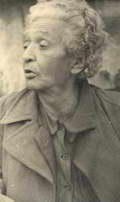Neyzen Tevfik Kolayl was one of the most interesting and unusual personalities of Turkish Music, and is remembered as one of the legendary heroes. He was born in Bodrum on March 28, 1879, and died on January 28, 1953 in Istanbul, at the age of 74. His life was a series of advenfures that might seem startling or at least incongruous to the common person. He might be found playing his ney (reed flute) one day in the Grand Viziers mansions with the repose of a king, and the next day on the streef, a handkerchief spread out in front of him, playing for drinking money. Having enough to get by on, he turned his back on worldly things such as money, possessions, and fame; and at times committed himself voluntarily to insane asylums when he felf that life had exhausted him.
Neyzen Tevfik spent the first nine years of his life in Bodrum, Urla and Izmir. After finishing elementary school. he attended Bodrum High School, where his father was headmaster. After his father was appointed to Urla High School he was transferred and continued his education there. He was then sent to the Izmir Lyceum, but at the age of 15 he began to suffer from epilepsy and was unable to finish. At 19, he was sent to a medrese (religious school) in Istanbul, but he didn't enjoy the system of education and thought, thus, this was also left uncompleted. Along the way however, he became acquinted with many people - scholars of literature, music, religious thought, language - who recognized his unparalleled talent on the ney, and making good use of these acquaintaces. He educated himself. He learned French as well as Arabic and Persian, and achieved such an understanding of Sufism and mystic thought that he was given special recognition by one of the modern time masters of the subject, Abdulbaki Golpnarl.
Neyzen Tevfk had a rebellious nature when it came to oppression, authority, and discipline. With his behavior and the company he kept, he was unable to escape the attention of the "black oppression administration" of Sultan Abdlhamit II, and was arrested. After a long and exhausting trial he learned that he had been condemned on thirty five counts, so at the beginning of 1902 he fled the country and went to Egypt, where he stayed until the declaration of the IInd Constitutional Monarchy. While there he lived many adventures, each more colorful than the last.
In 1910 he married, but the marriage failed, and when his daughter Leman was three months old, he left his wife. He spent the World War l as a soldier under the command of Muhtar Pasa, founder of the Army Museum in Istanbul, and as head of the Mehter (Ottoman military band). After the war, he was decorated for his activities in the rebellion that had begun to brew in Anatolia, and in the Turkish War of independence. The declaration of the Republic brought with it an effort to establish a new society in Turkey, and there was much hostility towards the old order and its reminants. Struggling constantly with duplicity, fraud, profiteering, opportunism, during the final chapter of his life he was characterized as "a walking admonition to others through his instrument, his words, and his straightforwardness."
He was smitten at the early age of 7 by the voice of the ney, and was so bound by his passion for this voice that it was the most basic element of his existence. From surviving recordings, as well as awe-filled testimonies of those writers who heard him play, we can understand how that passionate bond moved him.
Neyzen Teyfik was not only a musician, he was a poet as well. Aside from his poetry dealing with existential maners afid mystic love, he also wrote satirical poetry, and it is chiefly to this type of poetry that he owes his fame and renown as a poet. With curses and a razor-sharp tongue, his satire gained a wide appreciation among people.
Because of his rather scattered way of life, this artist with his singular personality, did not leave behind a truly representative legacy of his creative talent. Of his poetry, three books remain. Of the nearly 100 recordings he made, very few have survived to our day, as well as two compositions. Of his concerts we have the words of others; they took the true experience of his artistry to their graves.
Written by Mehmet Ergun
Translated by Bob Beer
